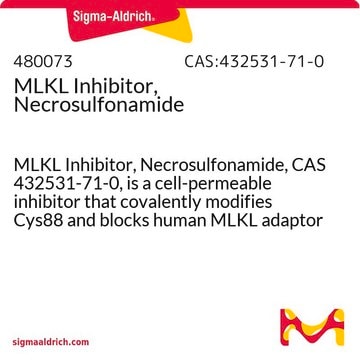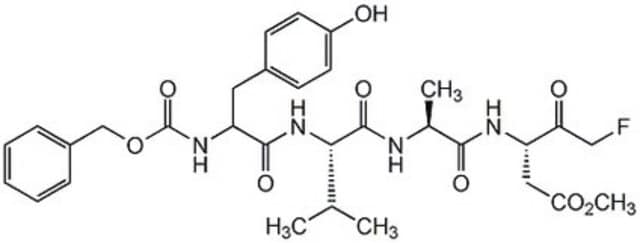V116
Z-VAD-FMK
≥98% (TLC), solid, Caspase inhibitor
Synonyme(s) :
N-Benzyloxycarbonyl-Val-Ala-Asp(O-Me) fluoromethyl ketone
About This Item
Produits recommandés
product name
Z-VAD-FMK, solid
Source biologique
synthetic
Niveau de qualité
Pureté
≥98% (TLC)
Forme
solid
Couleur
white
Solubilité
DMSO: 20 mg/mL
H2O: insoluble
Température de stockage
−20°C
InChI
1S/C22H30FN3O7/c1-13(2)19(26-22(31)33-12-15-8-6-5-7-9-15)21(30)24-14(3)20(29)25-16(17(27)11-23)10-18(28)32-4/h5-9,13-14,16,19H,10-12H2,1-4H3,(H,24,30)(H,25,29)(H,26,31)/t14-,16-,19-/m0/s1
Clé InChI
MIFGOLAMNLSLGH-QOKNQOGYSA-N
Informations sur le gène
human ... CASP3(836)
mouse ... CASP3(12367)
rat ... CASP3(25402)
Description générale
Application
- to induce mixed-lineage kinase domain-like (MLKL) phosphorylation (p-MLKL) in L929 cells
- to induce autophagy in Jurkat and K562 cells
- to revert killing effects of oxaliplatin or oxaliplatin combination with chloroquine (CQ) on HCT116 and SW620 cell lines
- as a caspase inhibitor to inhibit apoptosis and assess nuclear factor-kB, heat shock protein 70 (Hsp 70), proto-oncogene (cmyc) and tumor suppressor protein p53
Actions biochimiques/physiologiques
Caractéristiques et avantages
Conditionnement
Attention
Code de la classe de stockage
11 - Combustible Solids
Classe de danger pour l'eau (WGK)
WGK 3
Point d'éclair (°F)
Not applicable
Point d'éclair (°C)
Not applicable
Équipement de protection individuelle
Eyeshields, Gloves, type N95 (US)
Certificats d'analyse (COA)
Recherchez un Certificats d'analyse (COA) en saisissant le numéro de lot du produit. Les numéros de lot figurent sur l'étiquette du produit après les mots "Lot" ou "Batch".
Déjà en possession de ce produit ?
Retrouvez la documentation relative aux produits que vous avez récemment achetés dans la Bibliothèque de documents.
Les clients ont également consulté
Articles
Cell cycle phases (G1, S, G2, M) regulate cell growth, DNA replication, and division in proliferating cells.
Cell cycle phases (G1, S, G2, M) regulate cell growth, DNA replication, and division in proliferating cells.
Cell cycle phases (G1, S, G2, M) regulate cell growth, DNA replication, and division in proliferating cells.
Cell cycle phases (G1, S, G2, M) regulate cell growth, DNA replication, and division in proliferating cells.
Notre équipe de scientifiques dispose d'une expérience dans tous les secteurs de la recherche, notamment en sciences de la vie, science des matériaux, synthèse chimique, chromatographie, analyse et dans de nombreux autres domaines..
Contacter notre Service technique















